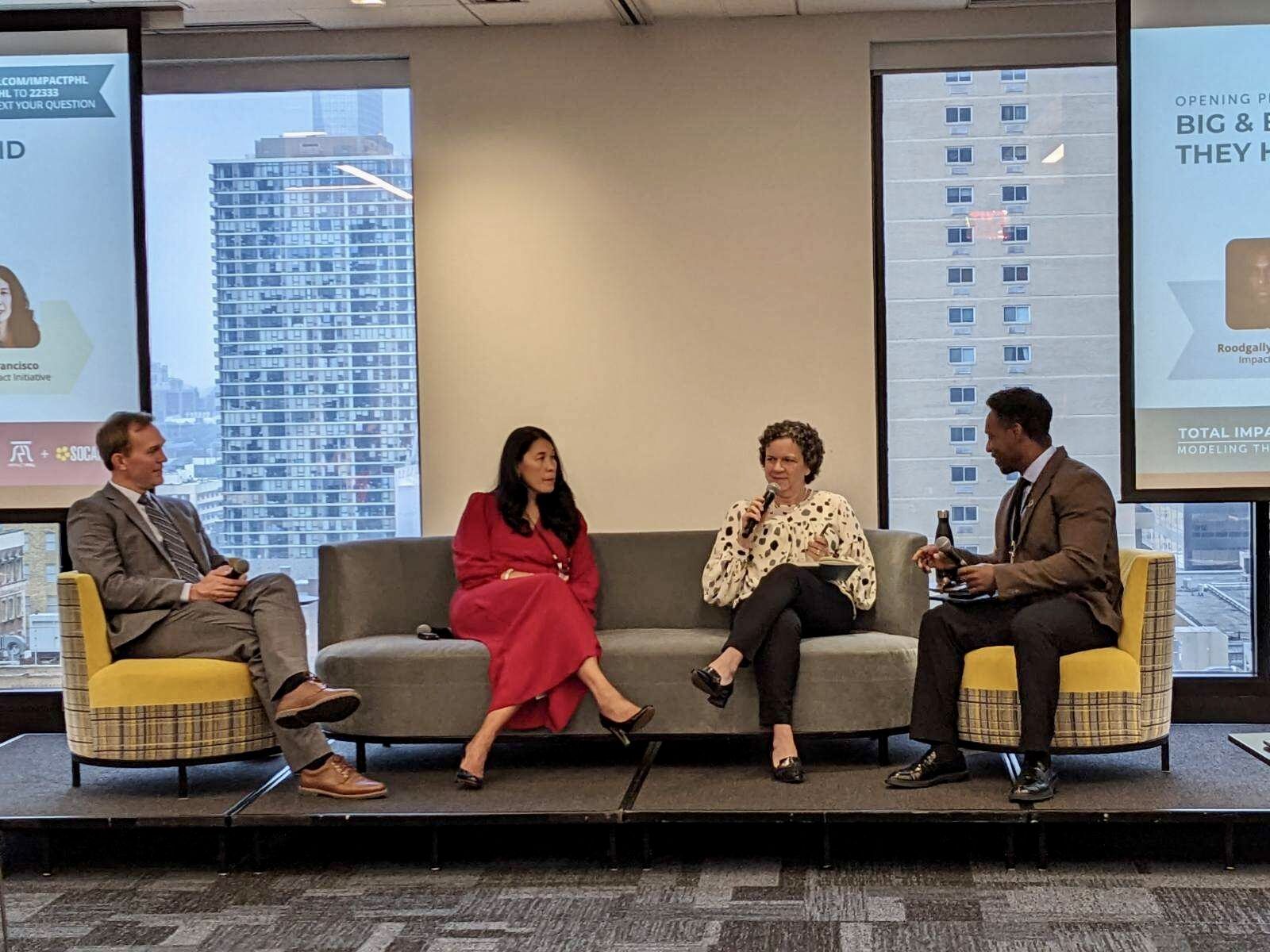Greetings, Agents of Impact!
Featured: Impact Voices
Accelerating entrepreneurship: Why business accelerators are good investments for global development. Since the launch of Y Combinator in Boston over a decade ago, business accelerators have spread like wildfire as a model for helping tech ventures grow. The programs are increasingly seen as a useful way to spur entrepreneurship not just in Boston or Silicon Valley, but in Ecuador, Indonesia, Nairobi and other nascent markets. Global Accelerator Learning Initiative, a research partnership between the Aspen Network of Development Entrepreneurs and Emory University, has collected performance data on over 19,000 ventures that have applied to over 280 accelerator programs to examine the effectiveness of these programs. The good news: Accelerators are good investments. On average, $1 in program costs leads to $1.70 in increased short-term funding for entrepreneurs in the form of revenue, equity investment, debt, and philanthropic funding. The caveat: these benefits vary wildly across programs. Just 10% of the accelerated ventures in the sample were responsible for all of the net benefits.
“Accelerators are not a magic bullet,” say ANDE’s Matthew Guttentag and University of Oregon’s Saurabh Lall (Lall co-authored a recent book on the study). Still, they say, “a growing body of evidence suggests that accelerators can be effective drivers of business growth.” In a guest post on ImpactAlpha, Guttentag and Lall share lessons on what makes some accelerators more effective than others. Networks and peer support matter more than curriculum, say the authors. Instellar, based in Indonesia, for example, recently reduced the number of in-person workshop sessions to make more time for one-on-one work with mentors and network development. Accelerators work better for fast-growing businesses than the large number of ‘typical’ businesses, they found. New Ventures, a Mexican accelerator, intentionally targets high performing social and environmental ventures with business models that are profitable, and importantly, scalable. The rationale is that such companies can most benefit from New Ventures’ network of funding sources, partners and allies. Accelerators should also aim to help entrepreneurs overcome the structural difficulties of their specific markets. IMPAQTO, in Ecuador, found a better use of resources in connecting ventures across Latin America to the Ecuadorian market than in supporting local, idea-stage ventures.
Keep reading, “Why business accelerators are good investments for global development,” by Matthew Guttentag and Saurabh Lall on ImpactAlpha.
Dealflow: Follow the Money
AeroFarm raises $100 million to grow vertical farms. New Jersey-based vertical farming venture AeroFarms has scored $100 million in funding, led by IKEA’s parent company, INGKA. A recognized name in a nascent field of farming, AeroFarms’ mission is to grow produce indoors with vastly improved resource efficiency compared to traditional outdoor farming and greenhouses. The company operates two commercial-scale vertical farms in the U.S., in which it grows greens to sell to nearby customers, including grocery store chains Whole Foods and ShopRite. The company’s funding round follows a $100 million raise by German vertical farming venture InFarm last month.
- In-door farming. Despite the large rounds AeroFarms and its peers are taking in, vertical farming technology has been slow to scale, due to costly technology and operational complexity. In contrast, greenhouse farm operators, which are also securing hundreds of millions of dollars, are rolling out large, ultra-high tech facilities that use 90% less water and can produce 10 times more food per square meter than outdoor farms.
- Patient capital. AeroFarms’ David Rosenberg told the Financial Times that the company explicitly sought out alignment with patient capital and impact potential in its latest funding round, signaling that vertical farming would take time to mature. Read on.
Bridges raises £35 million for second pay-for-success fund. Bridges Fund Management raised £35 million ($44 million) to orchestrate and launch pay-for-success initiatives in partnership with government backers. The Social Outcomes Fund will be used to finance social impact bonds. The new raise follows Bridges’ first Social Outcomes Fund, which launched in 2012 and financed 30 projects, addressing issues from youth homelessness and chronic health conditions to at-risk students. Bridges’ Mila Lukic said that social impact bonds have evolved from small, experimental funding schemes to a desirable option for government agencies to ensure flexibility and adaptability with social services delivery. Results from its first fund made the second fund popular among investors, the firm said. So much so that Bridges obtained consent from investors to expand it’s initial £30 million cap for the second fund. Big Society Capital invested £13.7 million. Other backers of the fund include social investment firm Project Snowball, Merseyside Pension Fund, insurance firm QBE, family office Ceniarth, and several charitable foundations. Check it out.
Dealflow overflow.
- Arctaris secures $10 million in Maine Opportunity Zone guarantees. The Finance Authority of Maine is making the commitment to kickstart $50 million in Opportunity Zone investments in the state. Arctaris earlier received a $15 million guarantee for its $500 million Opportunity Zone fund from the Kresge Foundation.
- Kenya’s Turaco secures seed funding for ultra-low-cost insurance. The company, which offers health coverage for as little as $2, took in a small slug of non-equity financing through the Catalyst Fund, the emerging markets fintech accelerator backed by JPMorgan Chase and the Gates Foundation.
- Nigeria’s DrugStoc secures investment to improve drug procurement traceability. The company launched in 2015 to help healthcare providers streamline drug procurement and dodge counterfeit stocks. Co-Creation Hub’s Growth Capital fund invested an undisclosed sum.
Signals: Ahead of the Curve
Assessing the expected impact of investments… before you make them. If impact investments can indeed deliver alpha returns, or mitigate risks, or simply deliver better outcomes for beneficiaries, understanding the expected impact of an investment before it’s made seems like a good idea. Yet the practice of impact due diligence, which includes all assessments of expected impact before making an investment, is still largely underdeveloped, says Pacific Community Ventures. In a new report, “Impact Due Diligence: Emerging Best Practices,” the Oakland-based community development financial institution and impact investing research firm rounds up what’s known about the emerging investment practice. “Systematically examining which investments are expected to generate more or less impact can help investors more closely align their investments with their objectives,” says PCV’s Daniel Brett, “and increase the likelihood that their portfolios reflect their values and goals.”
- Impact diligence systems. The International Finance Corp., which manages an impact investment portfolio of $58 billion, evaluates anticipated impact of project-level outcomes as well as systemic effects on the overall market with its Anticipated Impact Measurement and Monitoring tool. Bridges Fund Management’s Impact Radar system scores investees’ positive and negative impact in four criteria: industry leadership, target outcomes, Bridges’ value-add and alignment. HIP Investor, an investment advisor, classifies each potential public-equity investment as a direct, indirect or zero hit based performance against 117 Sustainable Development Goals-aligned metrics. Project Snowball, a UK impact investor, assesses general partners’ impact philosophy and culture, impact process, and engagement.
- Best practice. PCV identifies seven areas of emerging impact due diligence best practice. Among them: Assess impact using Impact Management Project’s five dimensions (what, who, how much, contribution, and risk), bridge the divide between ESG and impact assessments by evaluating both business operations and products or services, and evaluate the perspectives of stakeholders.
- Data-driven. The PRIME Coalition, the Cambridge climate nonprofit, is open-sourcing its Emissions Reduction Potential method for assessing early-stage ventures’ potential to reduce future carbon emissions.
- Share this post.
Building a successful social enterprise ecosystem—and what cities are doing it well. Boston, San Francisco, Washington and New York: It’s not surprising that these cities lead the ranks of social enterprise ecosystems in the U.S. Also on the list: Minneapolis and Raleigh, Pittsburgh and New Orleans, Detroit and Baltimore. The ranking, from the Halcyon Incubator, draws on a survey of more than 400 social entrepreneurs, interviews with experts, and public data. Its accompanying report, “A Deeper Dive: Social Enterprise Ecosystems in the U.S.,” sheds light on the ingredients that make a thriving ecosystem for social entrepreneurs. Among them:
- Financial capital. Funding is essential. But like most entrepreneurs, socially-minded founders say fundraising is a struggle. More than half self-finance their startups, including with friends and family funding. Just 6.6% of social entrepreneurs get venture capital funding, according to the report. In fact, local social entrepreneurs are more likely to generate cash from revenues or through crowdfunding than angel investors or VCs (see, “Equity crowdfunding changes who gets financed”). To do: Cities can create innovative funding structures to reduce financial risks.
- Human capital. Social entrepreneurs rank human capital as their most important criteria. Yet access to mentors, advisors and team members is a challenge, especially among African-American founders. Compared to their white counterparts, Black social entrepreneurs are less likely to benefit from mentors and are less comfortable reaching out to social entrepreneurs in their region for support. A growing number of cities are welcoming programs that support underrepresented entrepreneurs (see, “Building local startup ecosystems that work for entrepreneurs of color). To do: Digital platforms can make it easier to match social ventures with skilled volunteers and mentors.
- Quality of life. Cities need a high quality of life to attract great founders, and diversity, affordability, and transportation are key. Yet cities are not delivering. More than 80% of African American founders disagree that their city is inclusive and promotes diversity, and almost half of founders say a high cost of living makes it difficult to support themselves. City Startup Labs in Charlotte is creating space for a new class of young, African American male entrepreneurs to research, plan, launch, and operate their own ventures. To do: Cities should proactively focus on inclusive entrepreneurship.
- Share this post.
Agents of Impact: Follow the Talent
Susan Ruffo, ex- of Ocean Conservancy, becomes founding executive director of The Circulate Initiative, a non-profit created by Circulate Capital… JP Gibbonssays he’s moving on from USAID to join the mission-related investing team at Cambridge Associates (see, “A conversation with Circulate Capital’s Rob Kaplan and USAID’s J.P. Gibbons”)… FaithInvest is hiring an executive director and director of membership in the UK… Sustainalytics seeks an associate director of water in Toronto or Amsterdam… Blue like an Orange Sustainable Capital is looking for an investment analyst in Washington, DC.
— July 11, 2019.











